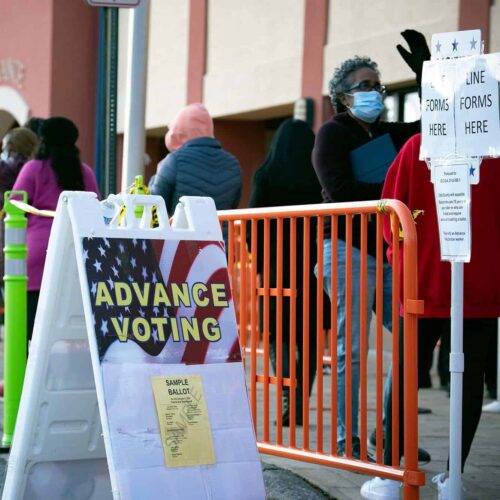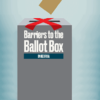This story was published in partnership with Georgia Public Broadcasting.
Introduction
Stephanie Lopez-Burgos stood in line about 35 minutes when she went to vote early in Georgia’s Senate runoff election and felt lucky it wasn’t longer. She saw social media posts from many Hall County residents who waited more than an hour — some of whom had to leave without voting.
“People are already living paycheck to paycheck,” she said. “Not working for an hour to go vote can be the difference of a bill not getting paid.”
New data shows typical wait times decreased at early voting sites for the January runoff in most of Georgia’s large counties compared with the November general election, partly due to a shorter ballot. But that wasn’t true in both Hall and another large county in the Atlanta area, Cobb, each of which has sizable communities of color and where voters faced lengthy waits.
Now Republicans in the state Legislature are pushing a slew of proposals that, had they been law during the runoff, almost certainly would have worsened delays by eliminating options that took some pressure off early voting locations.
Election experts say the 2020 election was fair, and courts have tossed out dozens of lawsuits filed by former President Donald Trump’s campaign and allied groups after finding no evidence of fraud. Nonetheless, Republicans around the country are sponsoring measures to constrain voter access, arguing they are responding to the perception that elections need to be more secure. Georgia, with a Republican-controlled legislature, is at the epicenter of that fight: Record participation from voters of color in the 2020 election and subsequent runoff helped Democrats flip the state’s electoral votes and both U.S. Senate seats.
After a disastrous June primary with hours-long lines, state and local elections officials took steps to increase funding, open more Election Day polls and provide flexible early voting options to cut down on wait times and boost turnout. In November, it worked: four out of five ballots in Georgia were cast before Election Day. Many voting locations reported short lines or none at all.
Georgia is a little over halfway through its 2021 legislative session, and it’s unclear what will ultimately become law. But the bills with the largest Republican support would reshape the choices available to voters and local election officials, shifting more of a burden on voters of color in large counties such as Hall and Cobb.
Officials in both counties, blaming strained resources, offered fewer early voting locations for the runoff than the general election. And both had typical wait times exceeding 30 minutes, according to an analysis of anonymized smartphone location data by the nonprofit Center for New Data provided to the Center for Public Integrity. A bipartisan commission on election administration in 2014 concluded no voter should have to wait more than 30 minutes, and research has found long lines can discourage voting.
In Hall, which typically votes Republican, estimated median wait times for early voters rose from 21 minutes in the first election to 36 minutes in the second. In Cobb, a county that recently swung Democratic and made headlines for long lines during the general election, estimated typical wait times stayed roughly the same, at nearly 40 minutes.
Delays might have been worse in Cobb if election officials, pressed by advocates, hadn’t agreed to open two more locations for the runoff’s final week of early voting. One of those additional sites, the Smyrna Community Center, is located in an area where about 38% of residents are Black. It had the county’s longest estimated median wait times for both the general and the runoff, the Center for New Data analysis found.
The county might not have been able to add those extra locations when it did, giving voters more options, if a bill filed after the election by several Cobb Republicans in the Georgia House had been in effect at the time. The proposal would require local officials to set early voting sites weeks before in-person voting begins, severely restricting later changes.
Republicans also want to standardize early voting hours across Georgia’s 159 counties, preventing larger jurisdictions from adding additional days to accommodate more voters. Among several other provisions, House Bill 531 would sharply limit Sunday voting, more likely to be used by voters of color.
And several measures in both chambers of the Georgia Legislature would limit the number of people eligible to vote by mail, allowing only those citing certain excuses to receive absentee ballots and adding several ID requirements. That would force more voters to cast ballots in person, increasing the burden on early voting sites and Election Day polls.
Yet another proposal included in House Bill 531 would ban counties from directly accepting private philanthropic funding for election administration, requiring that it go through the state. Nonprofits using money from wealthy donors, including Facebook CEO Mark Zuckerberg and former California Gov. Arnold Schwarzenegger, gave millions in 2020 to cover costs and open more polling places. Among the recipients: Cobb County.
Republican House Speaker Pro Tempore Jan Jones said eliminating direct outside funding is part of the bill’s larger effort to bring uniformity to how elections are run across Georgia.
“It will increase confidence in the election system by reducing the prospect of undue partisan influence,” she said. “Election activities should be government funded, period.”
Christian Grose, an associate professor at the University of Southern California’s Schwarzenegger Institute for State and Global Policy, which administered the Schwarzenegger money, said his evaluation of the grants to Georgia counties for the general election found they allowed more in-person voting sites and dropboxes for the runoff election as well.
‘No one has unlimited resources’
Election officials in both Hall and Cobb counties said the Senate runoff, coming on the heels of the 2020 presidential election, posed difficulties. They pointed to strained budgets and exhausted poll workers unwilling to labor through the holiday season.
“You know, no one has unlimited resources. We don’t have unlimited poll workers. We don’t have unlimited locations,” said Tom Smiley, who chairs the Hall County elections board.
Smiley said the county typically operates one early voting location most days and four on Saturdays. For the general election, Hall had eight locations, something he said the county couldn’t maintain for the runoff. Instead, it opened four, still more than usual.
“I know people waited — some 20, some 30, some 40 minutes. … I waited 22 minutes myself,” he said. “We feel like we had a good quality experience and a very reasonable waiting time.”
But voting rights advocacy groups wrote to Hall County after early voting started, alarmed when turnout during the first two days of early voting for the runoff was sharply below that of the same period for the general election. Locations in the most populous Latino communities had been closed, the letter noted, despite a lack of public transportation in the county.
Miranda Galindo, senior counsel at LatinoJustice PRLDEF, one of the groups that sent the letter, said organizers reaching out to Latinos in Hall County around the Senate runoff election saw informed voters, many lawn signs and other signals of high interest. “This was an election that was really important to the Latino electorate in Hall County,” she said. “The depressed turnout was a result of there being fewer locations.”
Galindo said some voters were confused when the location they had used for early voting in the general election, just two months earlier, wasn’t open.
Elton García-Castillo, Hall County field coordinator for the Georgia Association of Latino Elected Officials, said he spent time at the Spout Springs Library and a second site in downtown Gainesville, the voting locations he thought Latino voters were most likely to use, to help translate for Spanish-speaking voters. He saw long lines at both.
The library handled more voters on 11 of its 12 days of runoff early voting than on its busiest day of early voting for the general election, according to data from the Georgia secretary of state’s office analyzed by Georgia Public Broadcasting.
And wait times for many voters were longer. The Center for New Data analysis shows an estimated 36% of smartphones belonging to likely voters at Spout Springs Library were on site more than half an hour during early voting for the general election, but that percentage roughly doubled during early voting for the runoff.
Long lines, hard choices at some Georgia voting sites
Cobb County announced five early voting sites for the runoff, down from 11 in the general election. Voting advocates protested in a letter that the decision “will discourage or prevent many of Cobb County’s Black and Latinx voters from participating,” and the county ultimately opened two more sites. But those were only available in the final week of early voting.
Compared with the general election, turnout for the runoff in Cobb County was smaller, the percentage of voters casting ballots early in person dropped and the ballot itself was shorter. Even so, the Center for New Data found estimated median early vote wait times in Cobb ticked up by about a minute between the two elections to 39 minutes.
The data tracks with other reports of long lines at Cobb early voting sites. Pizza to the Polls, a nonprofit that sends food to crowded polling places, reported 39 deliveries on New Year’s Eve in Georgia. Of those, 35 went to Cobb early voting sites. One of the remaining deliveries was to the Spout Springs Library in Hall. (Among the Georgia election bills is a ban on offers of food and drink within 150 feet of a polling place.)
Monica DeLancy, 46, lives a few minutes by car from the Riverside EpiCenter, an early voting site in Cobb. When early voting for the runoff began, she came up with reasons to drive by repeatedly, hoping to spot a short line. On each occasion — about five times a day during the three weeks — she said she found crowds that suggested waits of more than half an hour. Sometimes, it was “well over an hour.”
DeLancy said she finally voted on Election Day. She dressed in layers, brought a folding chair and waited around half an hour.
Janine Eveler, the director of elections in Cobb County, said a shortage of experienced poll workers and a flood of mail-in ballots in need of counting limited the sites her office could open.
“We stretched our staff’s abilities so far in November that we lost some people. … They didn’t want to do this anymore,” she said.
The two extra locations the county opened during the final week of early voting in the runoff, she said, were made possible by new workers trained during the first two weeks as a “trial by firehose.”
Groups that wrote the letter urging Cobb to do more said they offered to help find workers for additional sites. “It is not good enough to hear that resources are an issue when you have voting rights advocates and organizations standing by to provide the help that you say that you purportedly need,” said Aklima Khondoker with the Georgia chapter of All Voting is Local. Khondoker and other advocates also pointed out that most other counties in the Atlanta metro area avoided reducing early voting sites for the runoff.
Eveler said Cobb did hire many new poll workers, but the real need was for experienced managers and assistant managers to oversee them.
In Fulton County, Georgia’s most populous jurisdiction, officials spent millions of dollars to push voters to cast their ballots before Election Day, set up mobile voting buses to provide extra voting machines and opened 30 sites, including at Atlanta’s NBA arena and NFL stadium.
The High Museum of Art in Atlanta, accessible by both bus and train, had one of the lowest estimated median wait times measured in the cell phone data for both elections. It served nearly 10,000 voters each time.
Common Cause Georgia Executive Director Aunna Dennis said the bills in the Legislature would roll back broad improvements in voting accessibility. “We have made so many good gains, actually, in Georgia when it came to access to the ballot, and now we see so many attacks,” she said.
Carrie Levine is a senior reporter at the Center for Public Integrity. She can be reached at clevine@publicintegrity.org. Follow her on Twitter @levinecarrie.
Kimberly Cataudella is a data fellow at the Center for Public Integrity. She can be reached at kcataudella@publicintegrity.org. Follow her on Twitter at @kcataudella.
Read more in Money and Democracy
Barriers to the Ballot Box
Pro-Trump nonprofit gives millions to groups boosting his agenda
Dollars flowed to groups registering voters and pushing restrictive election laws.
Barriers to the Ballot Box
Tight deadline, savvy pitch: How one red state expanded access to the ballot
As Republican states restrict voting options, Kentucky charts a path that looked impossible a year ago. Can anyone else follow?






Join the conversation
Show Comments